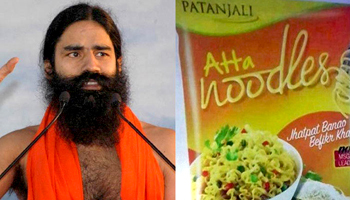Merut, Apr 4: The Food Security and Drugs Administration (FSDA) in Meerut has found the sample of Patanjali Atta Noodles, Maggie and Yippee below standard after a test.V.K Verma, the district officer of Department of Food and Drugs, told ANI that the tests were carried out on samples of Patanjali Noodles, Maggi and Yippee collected from Meerut in February.
"We found that the product of these three companies were below standard. The company and the vendors would be given notices and they have to respond on it," he added.
The permissible limit for ash content according to the law is one percent, but all the three samples failed the test and were found below standard for consumption.






Comments
how standard can make out from his own pic.
Below Standard products of below standard person , Wa Kya Bath Hey!
Ban all his products
UGLY MAN , UGLY PRODUCTS....!
he is a dirtiest person, how his product became a pure its logic. taurine person........
Guyz, just look at him. How do u expect quality standards from him?
Anyway good luck Sanghis, you are unclean anyway, now u can grow more unclean and unhealthy... Jai #MoNa
They are using cow urine in to it....substandard....
Low standard man will obviously have low standard products.
Add new comment